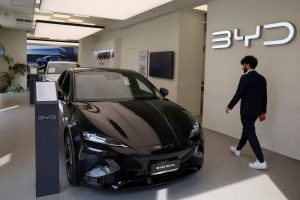(ATF) Sales of electric cars again outpaced those of traditional vehicles in October, figures released recently by the Chinese Passenger Car Association (CPCA) revealed.
While the overall sales rose 8% year-on-year in October to 1.99 million units, the retail sales of new energy vehicles (NEVs) was up 110.4% and reached 133,000 units. NEVs accounted for about 6.7% of overall auto sales.
NEV sales increased for a fourth-straight month, accelerating from an 84% gain in September and 47% in August. The NEV segment includes battery electric vehicles (BEVs) and plug-in hybrid EVs (PHEVs).
The Asia Eight: Daily must-reads from world’s most dynamic region
BEV sales hit 110,000 in October, up 136% compared with a year earlier. PHEV sales was up 38% to 23,000.
The production volume of NEVs in October was 149,000 units, which was also more than twice the figure a year earlier.
The Mini EV produced by SAIC and GM joint-venture Wuling was the country’s best-selling electric car in the month with 29,711 units sold. BYD ranked second with 22,395, and SAIC the third with 12,785.
Read More NEV News:
- New energy vehicles will reach 20% by 2025: China auto group
- Who killed the gasoline car? The future of electric cars
- Shanghai spending big to build the new ‘Silicon Valley’
Tesla was fourth among China’s electric car makers and sold 12,143 Made-in-China Model 3s in October. Some critics say that Tesla’s “flat” sales figure could have been caused by a shortage of supply given that its mega-factory in Shanghai is also producing the Model 3 for the European market.
Recovery momentum
“Since the second quarter of this year, the impact of the pandemic has decreased,” said Deng Xue, an analyst from TF Securities, in a commentary. “Consumer demand for cars is quickly recovering and has propelled retail sales to grow month-by-month.”
He expects the auto market to continue its rebound at year-end.
Speaking of NEV, Deng expects the remaining two months of 2020 to see a new wave of growth as car vendors roll out enhanced models, and Beijing and Shanghai have both introduced policies to encourage the purchase of NEVs.
Beijing and Shanghai have both been restricting the issuance of licence plates in order to prevent traffic congestion. Because of the scarcity and high cost of local licence plates, many residents have purchased plates from out of town instead.
In August, Beijing handed out 20,000 new licence plates that can only be applied to NEVs. Shanghai introduced a new policy just this month to restrict cars with non-Shanghai licence plates from running on elevated highways during the peak hours. The restricted areas will be extended to regular roads next year. This policy has pushed many consumers to purchase NEVs, which are given local licence plates as an exemption.
Since April, local governments in other parts of China have also introduced policies to promote the purchase of NEVs in a Covid-stricken economy. Guangdong and Hainan provinces are both offering a 10,000 yuan (US$1,508) subsidy for each purchase of a NEV until the end of this year.
NEV roadmap
For many decades, Western brands have dominated the Chinese auto market through their JV partnerships. Unable to compete with pure domestic products, the Chinese auto industry looked for leapfrog technologies that could also end its reliance on imported oil, address the affordability of products for the rising middle class and curbing deadly pollution.
To nurture the market, starting in June 2010, the Chinese government issued multiple NEV incentive programmes and reaffirmed the cars’ priority in the 13th Five-Year Plan. By 2019, there were already 2.58 million BEVs in China, compared with 0.97 million in Europe, and 0.88 million in the US, according to the International Energy Agency.
Looking forward to years 2021-2035, China aims for NEVs to account for 20% of all new auto sales in the country by 2025, and by 2035 all new vehicles sold will be “eco-friendly” – with energy-saving vehicles and NEVs accounting for half each.
China Society of Automotive Engineers predicts that 95% of NEV sales in 2035 will be BEVs, while hybrid vehicles will make up the rest.























